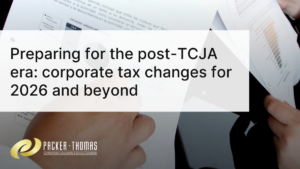Today, many banks are working with struggling borrowers on loan modifications. Recent guidance from the Financial Accounting Standards Board (FASB) confirms that short-term modifications due to the COVID-19 pandemic won’t be subject to the complex accounting rules for troubled debt restructurings (TDRs). Here are the details.
Accounting for TDRs
Under Accounting Standards Codification (ASC) Topic 310-40, Receivables — Troubled Debt Restructurings by Creditors, a debt restructuring is considered a TDR if:
- The borrower is troubled, and
- The creditor, for economic or legal reasons related to the borrower’s financial difficulties, grants a concession it wouldn’t otherwise consider.
Banks generally must account for TDRs as impaired loans. Impairment is typically measured using the discounted cash flow method. Under this method, the bank calculates impairment as the decline in the present value of future cash flows resulting from the modification, discounted at the original loan’s contractual interest rate. This calculation may be further complicated if the contractual rate is variable.
Under U.S. Generally Accepted Accounting Principles (GAAP), examples of loan modifications that may be classified as a TDR include:
- A reduction of the stated interest rate for the remaining original life of the debt,
- An extension of the maturity date or dates at a stated interest rate lower than the current market rate for new debt with similar risk,
- A reduction of the face amount or maturity amount of the debt as stated in the instrument or other agreement, and
- A reduction of accrued interest.
The concession to a troubled borrower may include a restructuring of the loan terms to alleviate the burden of the borrower’s near-term cash requirements, such as a modification of terms to reduce or defer cash payments to help the borrower attempt to improve its financial condition.
Recent guidance
Earlier this year, the FASB confirmed that short-term modifications made in good faith to borrowers experiencing short-term operational or financial problems as a result of COVID-19 won’t automatically be considered TDRs if the borrower was current on making payments before the relief. Borrowers are considered current if they’re less than 30 days past due on their contractual payments at the time a modification program is implemented.
The relief applies to short-term modifications from:
- Payment deferrals,
- Extensions of repayment terms,
- Fee waivers, and
- Other payment delays that are insignificant compared to the amount due from the borrower or to the original maturity/duration of the debt.
In addition, loan modifications or deferral programs mandated by a federal or state government in response to COVID-19, such as financial institutions being required to suspend mortgage payments for a period of time, won’t be within the scope of ASC Topic 310-40.
For more information
The COVID-19 pandemic is an unprecedented situation that continues to present challenges to creditors and borrowers alike. Contact your CPA for help accounting for loan modifications and measuring impairment, if necessary.
© 2020







